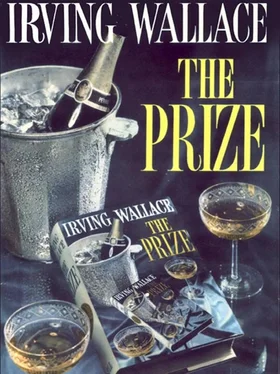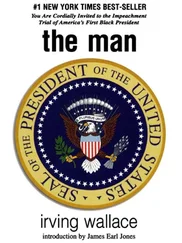‘Yes, I am Count Jacobsson,’ he said.
She transferred her loose-leaf pad to her left hand and extended her right. ‘I’m Sue Wiley,’ she said. ‘I’ve been sent here by Consolidated Newspapers of New York. You were pointed out to me, when I got off the plane with the Garretts.’
Jacobsson inclined his head courteously. ‘It is a pleasure to meet you. We have your credentials at the Foundation.’
‘I’m not here for a one-shot, Count Jacobsson. It’s a tremendous assignment.’ Her visage was alive with dedication. ‘I’m going to do fourteen-fourteen articles-on the Nobel Prizes, past and present. They’ll break in fifty-three papers. Isn’t that something?’
‘I could not be more pleased,’ said Jacobsson. He tried to place Consolidated Newspapers, tried to sort them out of the classification of memory, and then suddenly, he remembered. Consolidated Newspapers was a features syndicate, servicing America and Great Britain, much devoted to exclamation points and inside stories and rude sensationalism. Once they had issued an account-unfortunately published throughout Sweden, also-implying that Dr. Albert Schweitzer of Lambaréné, was arrogant and vain, basically disinterested in individual human beings, and that his hospital in Africa was unclean. Jacobsson had been offended by the appalling account. His own memory of Schweitzer, with whom he had dined in Stockholm before 1924, when the universal man had been doing organ recitals and lectures to raise money for his hospital, had been highly favourable. He had affected Jacobsson in a way that clergymen often affected him: uneasiness in the presence of someone in touch with metaphysical secrets beyond our grasp, someone deceptively in our image yet known to be a favoured son of God. Now Jacobsson tried to remember who had maligned this genius, this St. Francis with his reverence for life, but could remember only that the account had been credited to Consolidated Newspapers of America. If Miss Wiley was from this same syndicate, his guard had better be up.
‘-would be impossible without your full co-operation,’ she was saying, and Jacobsson realized that he had not been listening. ‘This isn’t the usual ephemeral newspaper nonsense,’ she went on. ‘I want it to be so thorough, so correct, that students reading it will feel they are learning all there is to learn of Alfred Nobel, your Foundation, the history of the prize giving, the stories of the many winners, the ceremonies, and so forth. I want to do full profiles on this year’s winners. Make the series topical, you know. I’ll want to see each of them personally. Do you think you could arrange it?’
‘I’m afraid, Miss Wiley, that would be somewhat outside my province. I would suggest you contact the parties personally.’
‘I’ll want to talk to you, too, and loads of the Nobel judges and officials and so forth. Surely, that kind of co-operation is in your province?’
‘Yes, it is. The only difficulty will be the matter of time. I am certain you understand. This is Nobel Week. All year, we aim towards this one week. We are hosts, and we have duties and functions. The demands on our time are great.’
‘I can’t think of anything more important than what I’m trying to do for you.’
Jacobsson smiled bleakly. ‘We appreciate it, Miss Wiley. Do not misunderstand. We are here to serve you. I would suggest you telephone me at the Foundation tomorrow morning. After ten. I shall do my best to arrange what I can for you.’ Jacobsson heard his own voice, and realized that the room was beginning to quieten. He looked off. ‘I believe the interview is commencing again.’
Straightening in his chair, Jacobsson remembered one point and was curious about it. He leaned towards Sue Wiley. ‘How has it gone so far?’ he inquired. ‘How has Mr. Craig been?’
Sue Wiley blinked, sniffed, and looked off. ‘I don’t like him,’ she said. ‘He’s too disdainful.’
Across the room, setting down his empty glass on the end table beside the couch, Andrew Craig, preparing to endure the last portion of the press conference, felt no emotion akin to disdain. If some few, like Sue Wiley, had misinterpreted his too quick, too curt replies or his over casual attitude, as scorn for them, the rabble journalists, and their stupid questions, it was an unfortunate accident of behaviour. As a matter of fact, Andrew Craig, when he was able to pin his mind to the activity at hand, had been favourably impressed by the intelligence of his inquisitors and the quality of their inquiries.
What had affected Craig, shortly after his arrival in the Swedish Press Club, was not scorn for Grub Street, but rather self-despair. If he hoped, as Leah and Lucius hoped, that the change of scene and the high honour accorded him would revitalize his interest in life, in creativity, he was wrong, and they were wrong. The laureate Craig was a mockery of the other man he had once been. The reception and adulation, also, seemed intended for someone else, someone who had written The Perfect State and Armageddon , and not for him, this day, an impostor, an impersonator of the real Andrew Craig. His attendance at the Press Club seemed even more futile. The questions asked were being asked of another man, and his replies were by proxy. The other man might have cared. He did not. It all seemed wasted, like giving information for a story that would never be printed.
The fresh drink had helped, and he uncrossed his legs, and put the unfilled pipe in his mouth, and leaned forward, elbows on his knees, trying to appear interested, determined to do better by that other man who had written those books.
The room was attentive, and the interrogation resumed.
‘Mr. Craig,’ said the man from the Stockholm Dagens Nyheter , ‘is it true that you are only thirty-nine years of age?’
‘Only?’ echoed Craig with surprise. ‘Since when is anyone only thirty-nine?’
‘In terms of the Nobel literary award, sir, that is extreme youth. I believe you are the youngest winner to date. Previously, Rudyard Kipling was the youngest. He was forty-two when he came here in 1907, and Albert Camus was the second youngest, forty-four when he came here in 1957.’
‘Well, I assure you, I’ve established no record,’ said Craig. ‘I would allow Mr. Kipling to remain your juvenile lead. He was always younger than forty-two, and I’ve always been older than thirty-nine.’
‘Thank you on behalf of the British Empire,’ called the man from Reuter.
Everyone laughed, and Craig smiled boyishly, and good cheer was restored to the room.
‘I wonder,’ said the man from Dagens Nyheter , ‘why our committees honour so many young scientists and old writers? Would you have any comment on that?’
‘I didn’t know you favoured young scientists,’ said Craig. ‘It’s hard for me to imagine. When I see news pictures of them, they always seem wrinkled and stooped, as though they invented seniority to give you confidence in their magic.’
‘Quite the contrary,’ the man from Dagens Nyheter persisted. ‘The Nobel Prize-winning physicist in 1960, Donald Glaser, was thirty-four years old. Chen Ning Yang and Tsung Dao Lee, of your country, who divided the physics prize in 1957, were thirty-five and thirty-one, respectively. Dr. Frederick Banting, of Canada, who won the medical prize in 1923, was just thirty-two years of age. William L. Bragg, of England, who won the physics prize in 1915, was only twenty-five. I believe that is the record. But you are the first winner of the Nobel Prize in literature under forty. Can you explain that?’
‘I should imagine the reason for this may be found in the nature of the awards,’ said Craig. ‘You give all your science prizes for a single discovery. A man may make this discovery in his twenties or thirties as easily as in his fifties or sixties. But you give the literary award not for one work, but for a body of work. It takes a long time to build up a list of books. It’s taken me thirty-nine years to write four novels, and you say I’m the youngest. Most writers are elderly gentlemen by the time they have produced sufficient quantity to be judged. Also, I believe, writers ripen more slowly than scientists. A brilliant physicist can often display his genius all at once, at an early age. Experience is less important to him than flash perception and inspiration. Writers, no matter how brilliant, are immature and callow when they are young. Words are not enough. Life provides their materials, and usually they are not good enough until they have lived enough.’ He half smiled. ‘Living enough takes time.’
Читать дальше












